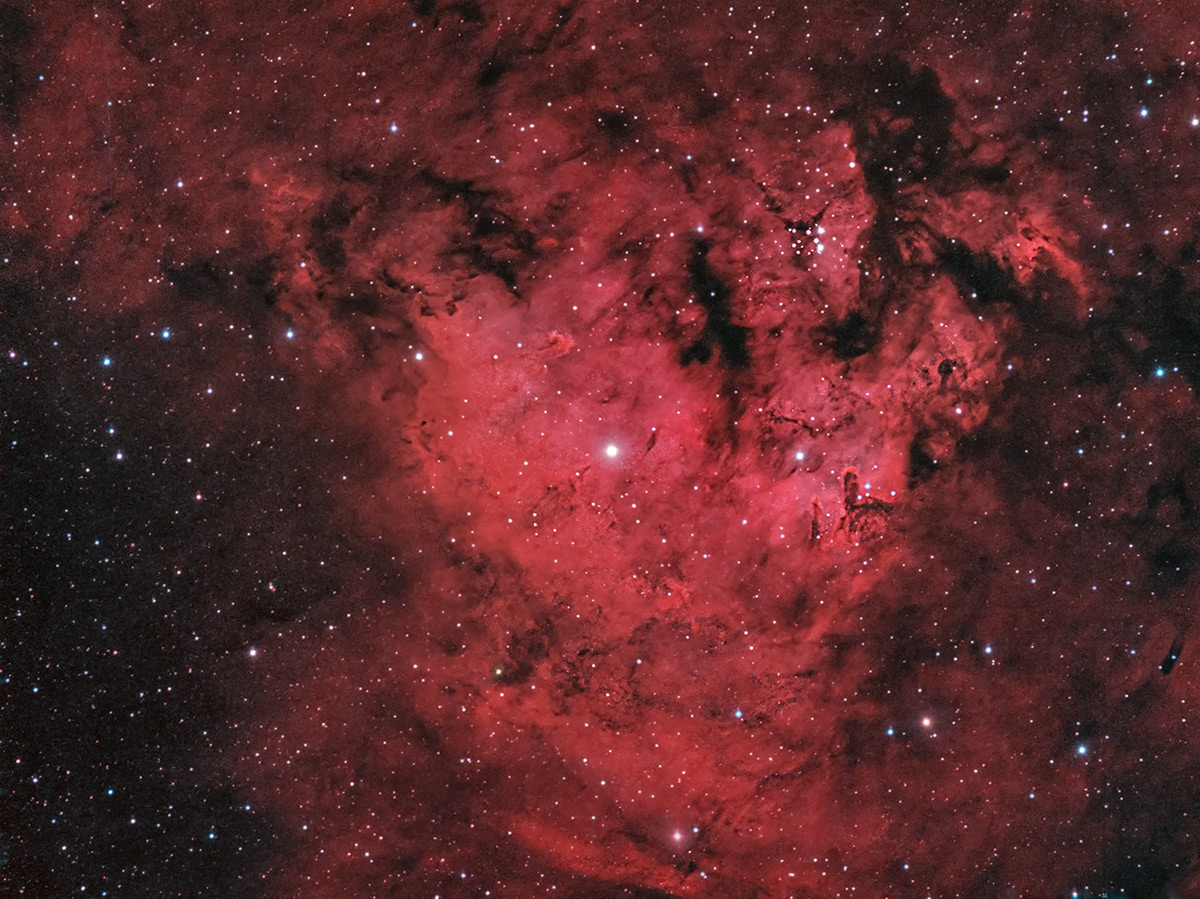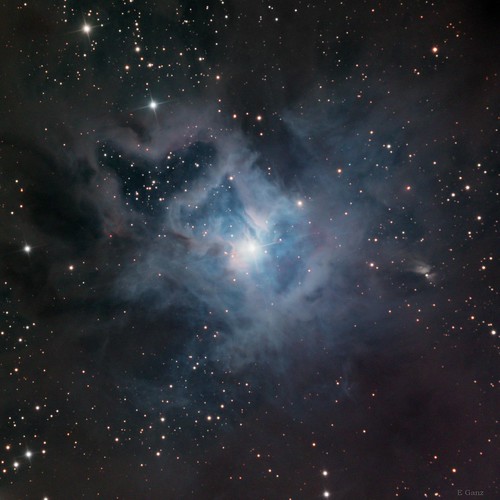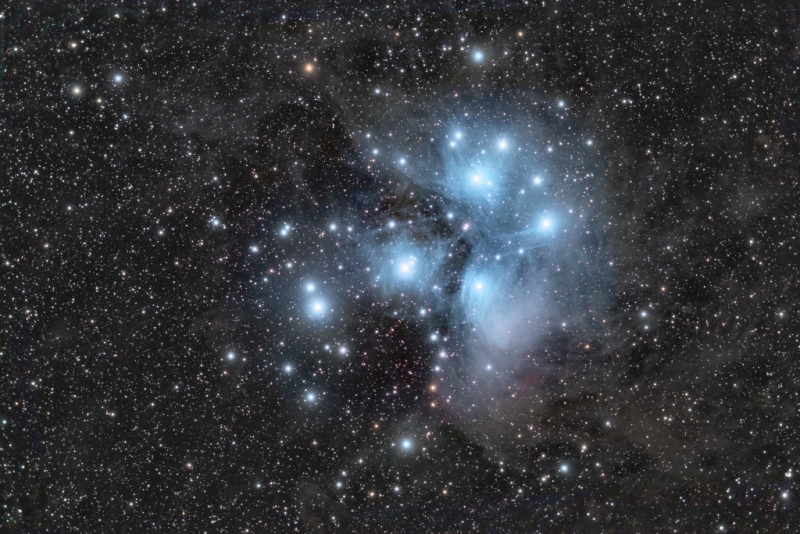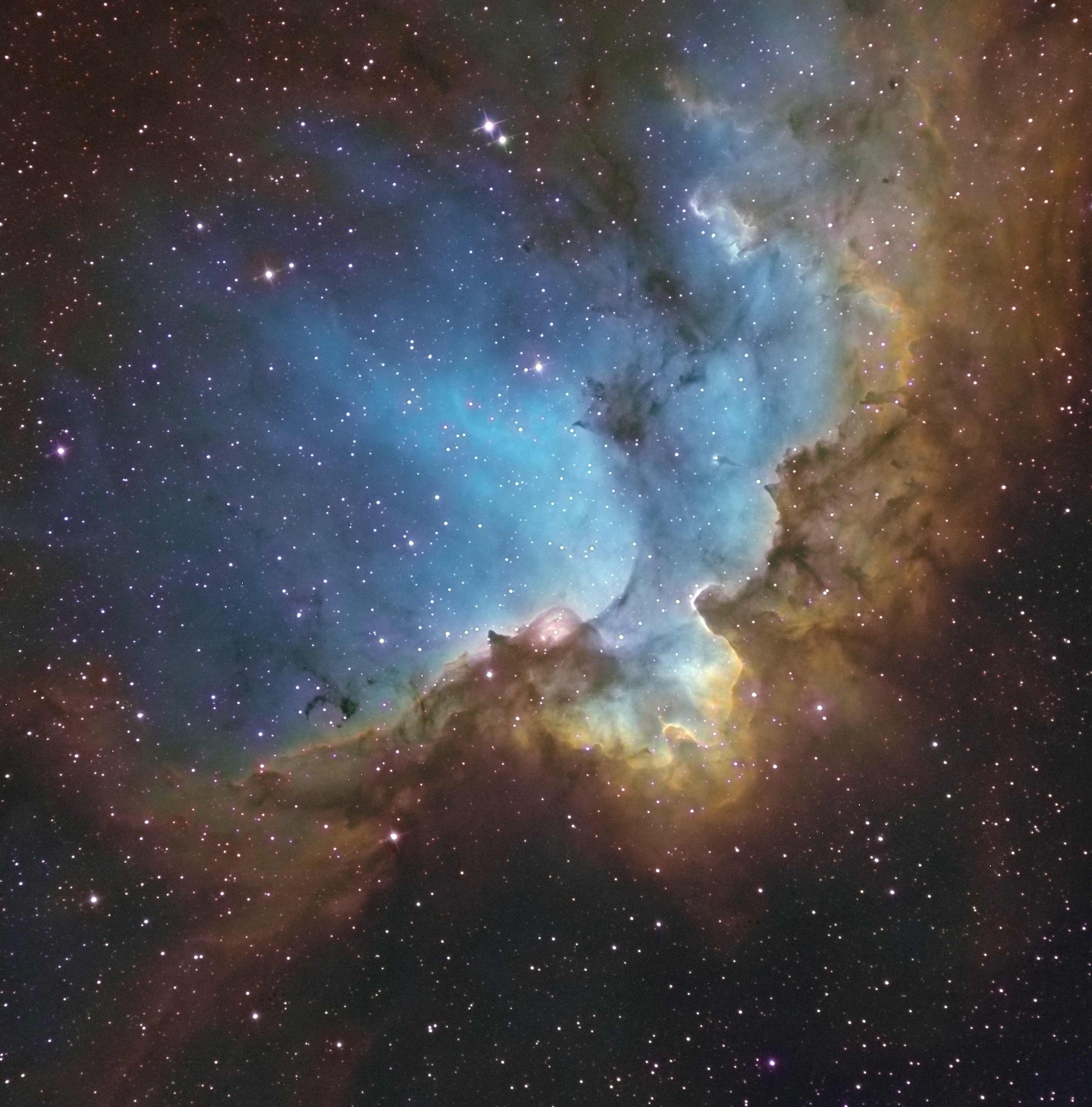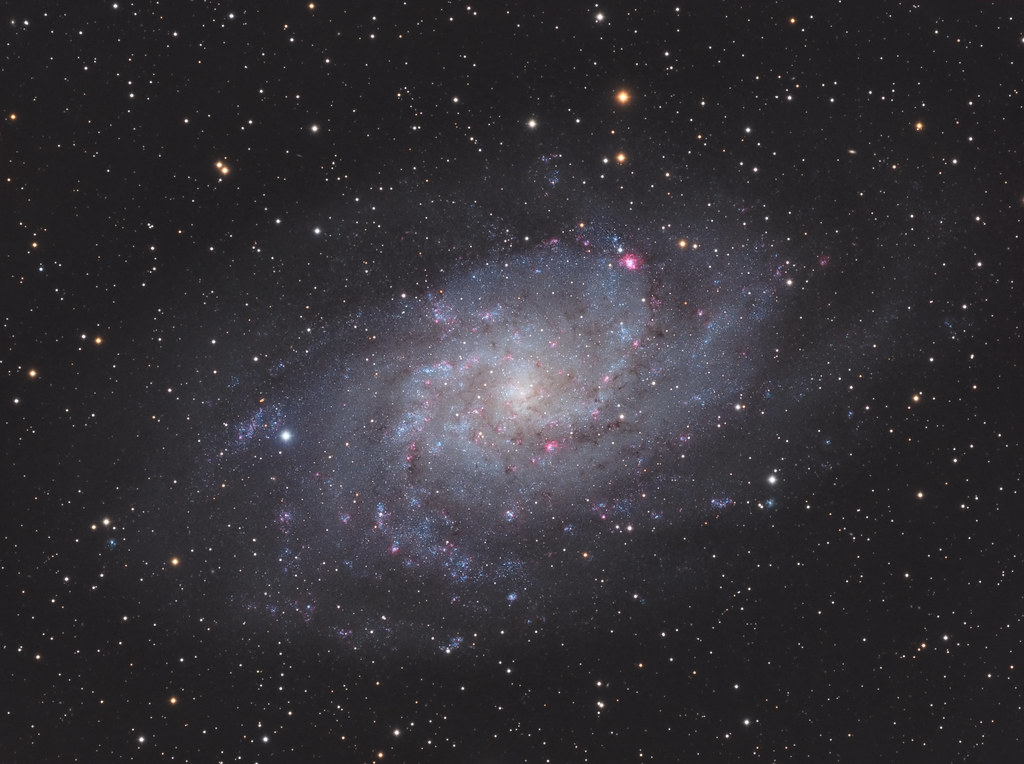Submissions: 2017 September
Re: Submissions: 2017 September
Airglow impact over the Yellowstone
Copyright: Petr Horálek
More info and image in higher resolution: http://www.astronom.cz/horalek/?p=3300
Copyright: Petr Horálek
More info and image in higher resolution: http://www.astronom.cz/horalek/?p=3300
Last edited by Petr H. on Sun Sep 24, 2017 10:40 am, edited 1 time in total.
Re: Submissions: 2017 September
Two eclipses of August 2017
Copyright: Petr Horálek / ESO (http://www.eso.org/public/) / Solar Wind Sherpas (http://project.ifa.hawaii.edu/solarwindsherpas/)
More info and image(s) in higher resolution:
http://www.astronom.cz/horalek/?p=3268
http://www.astronom.cz/horalek/?p=3248
https://www.eso.org/public/images/potw1733a/
Copyright: Petr Horálek / ESO (http://www.eso.org/public/) / Solar Wind Sherpas (http://project.ifa.hawaii.edu/solarwindsherpas/)
More info and image(s) in higher resolution:
http://www.astronom.cz/horalek/?p=3268
http://www.astronom.cz/horalek/?p=3248
https://www.eso.org/public/images/potw1733a/
Re: Submissions: 2017 September
Sharpless 171
Image description and imaging details may be viewed here:
http://www.waid-observatory.com/sh2-171-2017-09-20.html
(Click on the displayed images to view at higher resolution.)
Copyright: Donald Waid
http://www.waid-observatory.com
http://www.waid-observatory.com/sh2-171-2017-09-20.html
(Click on the displayed images to view at higher resolution.)
Copyright: Donald Waid
http://www.waid-observatory.com
-
eric ganz
Re: Submissions: 2017 September
A while ago I saw a post from Pete Lawrence from BBC Sky at Night in which he showed that you can see the lunar limb profile in the images from the Baily beads taken during the solar eclipse. When I started making an beads sequence I remembered this post and thought it was worthwhile to see if I could do something like that also. It showed that I had about 15 bead images during C2 and C3 and so I started adding them to my image and I was heavily surprised.
Using Solar Eclipse Maestro I then generated a lunar limb profile (80x exaggerated) to compare with my imagery. This is shown as the white line on the inside of the beads. What surprised me was that the limb was so clearly visible, but even more that also in the part outside the beads you can still see limb features in the solar chromosphere clearly.
In the image I tried to link some of the features to the chromosphere banding that is visible. This is a nice example how you can even do some 'science' using your own eclipse data.
The images were taken with a Nikon D810a equipped with a Nikon 300mm f/4 lens.
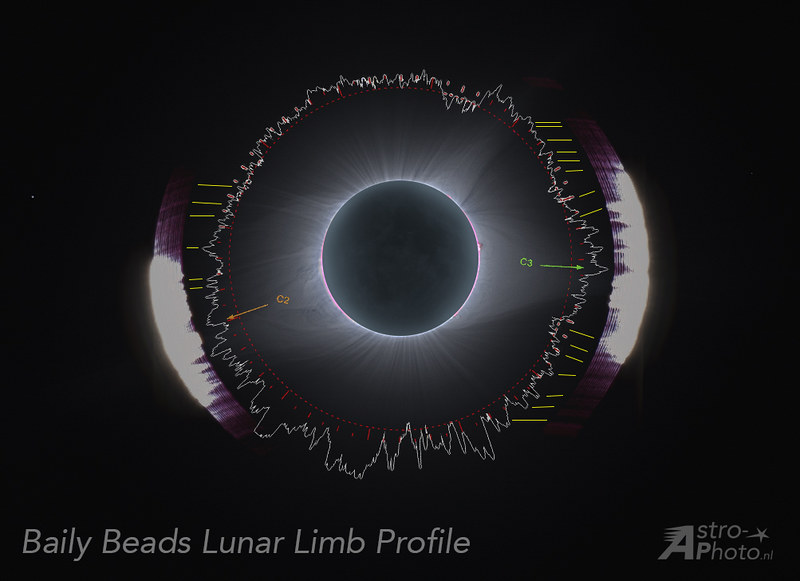
Lunar Limb profile from Solar Eclipse imagery by Andre van der Hoeven, on Flickr
Using Solar Eclipse Maestro I then generated a lunar limb profile (80x exaggerated) to compare with my imagery. This is shown as the white line on the inside of the beads. What surprised me was that the limb was so clearly visible, but even more that also in the part outside the beads you can still see limb features in the solar chromosphere clearly.
In the image I tried to link some of the features to the chromosphere banding that is visible. This is a nice example how you can even do some 'science' using your own eclipse data.
The images were taken with a Nikon D810a equipped with a Nikon 300mm f/4 lens.

Lunar Limb profile from Solar Eclipse imagery by Andre van der Hoeven, on Flickr
-
keithlt21
Re: Submissions: 2017 September
http://astrob.in/full/313463/B/
image of SH-230
Imaging telescope or lens: William Optics gt-81 GT-81
Imaging camera: qhyccd 163m
Mount: Losmandy GM-8 Gemini 2 gm-8 with Gemini 2
Focal reducer: William Optics Flat 6A
Software: Planewave PlateSolve 2 Platesolve 2, Deep Sky Stacker 3.3.4 deepskystacker, Photoshop CC
Filter: Astrodon 36mm
Accessories: Moonlite DRO focuser&rotator moon, qhyccd polemaster
Resolution: 4656x3522
Dates: Sept. 24, 2017
Frames: Astrodon 36mm: 102x80" -10C bin 1x1
Integration: 2.3 hours
Darks: ~20
Flats: ~20
Flat darks: ~20
Avg. Moon age: 3.68 days
Avg. Moon phase: 14.53%
Mean SQM: 19.62
Temperature: 18.00
Astrometry.net job: 1742568
RA center: 79.691 degrees
DEC center: 33.864 degrees
Pixel scale: 2.016 arcsec/pixel
Orientation: 116.415 degrees
Field radius: 1.635 degrees
Locations: backyard, Queen Creek, Arizona, United States
image of SH-230
Imaging telescope or lens: William Optics gt-81 GT-81
Imaging camera: qhyccd 163m
Mount: Losmandy GM-8 Gemini 2 gm-8 with Gemini 2
Focal reducer: William Optics Flat 6A
Software: Planewave PlateSolve 2 Platesolve 2, Deep Sky Stacker 3.3.4 deepskystacker, Photoshop CC
Filter: Astrodon 36mm
Accessories: Moonlite DRO focuser&rotator moon, qhyccd polemaster
Resolution: 4656x3522
Dates: Sept. 24, 2017
Frames: Astrodon 36mm: 102x80" -10C bin 1x1
Integration: 2.3 hours
Darks: ~20
Flats: ~20
Flat darks: ~20
Avg. Moon age: 3.68 days
Avg. Moon phase: 14.53%
Mean SQM: 19.62
Temperature: 18.00
Astrometry.net job: 1742568
RA center: 79.691 degrees
DEC center: 33.864 degrees
Pixel scale: 2.016 arcsec/pixel
Orientation: 116.415 degrees
Field radius: 1.635 degrees
Locations: backyard, Queen Creek, Arizona, United States
Re: Submissions: 2017 September
Widefield view of Auriga - Flaming Star Nebula(IC 405), IC 410, M38
2 hrs total integration, in Hwacheon, South Korea
Taken by Jiyong Youn (https://atik.kr)
2 hrs total integration, in Hwacheon, South Korea
Taken by Jiyong Youn (https://atik.kr)
- moonrocks
- Science Officer
- Posts: 119
- Joined: Tue Jun 30, 2015 6:50 pm
- Location: spain, valencia
- Contact:
Re: Submissions: 2017 September
http://moonrocksastro.com/wp-content/up ... e-Veil.jpg
Pickering's Triangle in the Veil
website and image: http://moonrocksastro.com/wp-content/up ... e-Veil.jpg
Copyright: Paul C. Swift
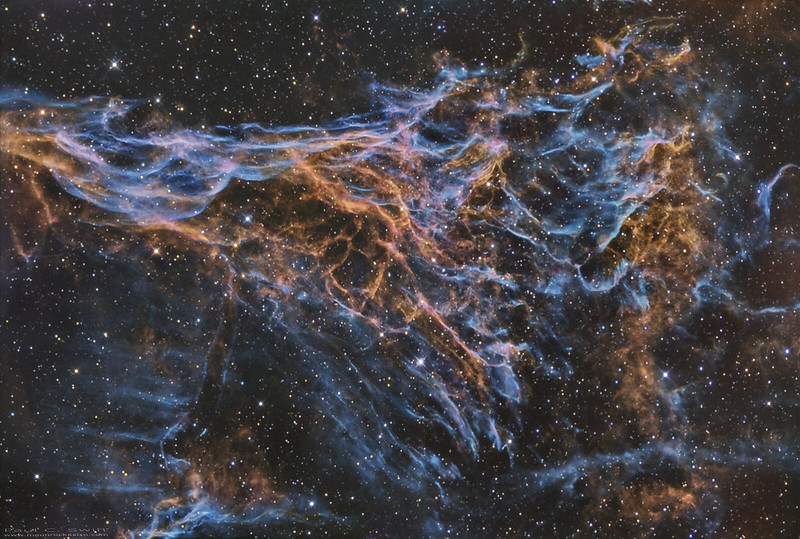 Pickering's Triangle in the Veil by Paul C. Swift, on Flickr
Pickering's Triangle in the Veil by Paul C. Swift, on Flickr
Pickering's Triangle in the Veil
website and image: http://moonrocksastro.com/wp-content/up ... e-Veil.jpg
Copyright: Paul C. Swift
 Pickering's Triangle in the Veil by Paul C. Swift, on Flickr
Pickering's Triangle in the Veil by Paul C. Swift, on Flickr-
SpookyAstro
- Science Officer
- Posts: 117
- Joined: Sat Feb 07, 2015 7:38 pm
Re: Submissions: 2017 September
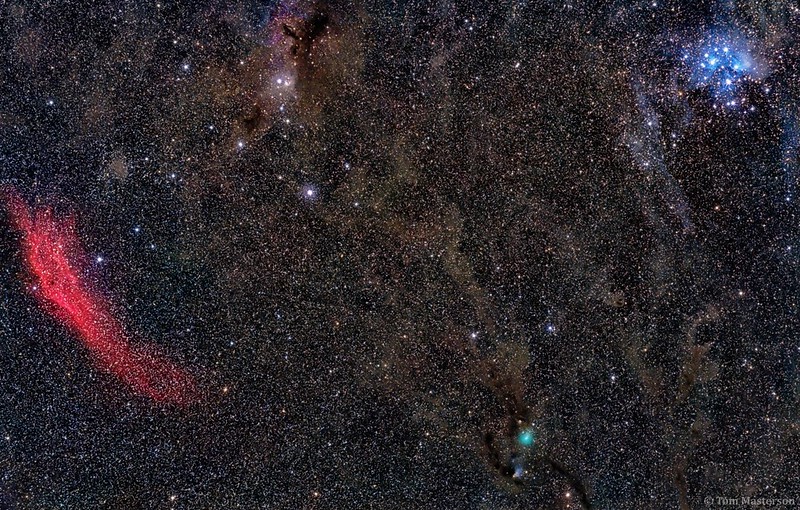 Comet C/2017 O1 (ASAS-SN) Slides by the Pleiades and California Nebula by Transient Astronomer, on Flickr
Comet C/2017 O1 (ASAS-SN) Slides by the Pleiades and California Nebula by Transient Astronomer, on FlickrImage Credit and Copyright Tom Masterson
-
Greg Parker
Deep M45
Copyright Prof. Greg Parker 2017
A Deep M45 using the MiniWASP array at the New Forest Observatory, U.K.
A Deep M45 using the MiniWASP array at the New Forest Observatory, U.K.
Re: Submissions: 2017 September
The Grus Triplet - Interacting Galaxies
This group of galaxies are located in the southern skies, in the constellation of Grus. Translated from Latin, it means ‘the crane’. The constellations of Grus, Pavo, Phoenix, and Tucana are collectively known as the ‘Southern Birds’.
The common name for this group is The Grus Triplet. They are interacting galaxies. If you look carefully, the tidal tales of the galaxies can be seen fairly easily in the two smaller galaxies on the right side of the frame. The image contains several hours of H-Alpha (Ha) data. This is a specific deep-red visible spectral line, and is often used by astronomers as it is emitted by many emission nebula. I included this within the image to highlight these emission areas within the small galaxies
Full Frame Version

Cropped Version

Terry
This group of galaxies are located in the southern skies, in the constellation of Grus. Translated from Latin, it means ‘the crane’. The constellations of Grus, Pavo, Phoenix, and Tucana are collectively known as the ‘Southern Birds’.
The common name for this group is The Grus Triplet. They are interacting galaxies. If you look carefully, the tidal tales of the galaxies can be seen fairly easily in the two smaller galaxies on the right side of the frame. The image contains several hours of H-Alpha (Ha) data. This is a specific deep-red visible spectral line, and is often used by astronomers as it is emitted by many emission nebula. I included this within the image to highlight these emission areas within the small galaxies
Full Frame Version

Cropped Version

Terry
Collecting Photons.....
Images Gallery
https://www.astrobin.com/users/trobison/
https://www.flickr.com/photos/97807083@ ... 6565068452
Images Gallery
https://www.astrobin.com/users/trobison/
https://www.flickr.com/photos/97807083@ ... 6565068452
-
mikiclinic
- Ensign
- Posts: 46
- Joined: Tue Oct 18, 2011 3:36 pm
Re: Submissions: 2017 September
The Wizard Nebula
This image was taken with 20inch RC with SBIG Adaptive optic system & PL09000 cooled CCD camera .
ASTRODON 3nm Narrow band filter: SAO(300min/300min/300min)
http://www.miki-hosp.or.jp/BIND/
Copyright: Nobuhiko Miki
This image was taken with 20inch RC with SBIG Adaptive optic system & PL09000 cooled CCD camera .
ASTRODON 3nm Narrow band filter: SAO(300min/300min/300min)
http://www.miki-hosp.or.jp/BIND/
Copyright: Nobuhiko Miki
-
markh@tds.net
- Science Officer
- Posts: 117
- Joined: Wed Oct 03, 2012 7:44 pm
Re: Submissions: 2017 September
Simeis 3-210
An obscure part of the Veil Nebula I like to call Leaping Leopard Nebula
Copyright: Mark Hanson Here is a very interesting part of the Veil Nebula Simeis 3-210 is a long, thin filament at the extreme southern end of the Veil Nebula and is virtually unknown (not listed separately in SIMBAD) Never imaged at this resolution to my knowledge, take peak at the larger version here:
https://www.hansonastronomy.com/veil-nebula-simeis-3210
Thank you,
Mark Hanson
An obscure part of the Veil Nebula I like to call Leaping Leopard Nebula
Copyright: Mark Hanson Here is a very interesting part of the Veil Nebula Simeis 3-210 is a long, thin filament at the extreme southern end of the Veil Nebula and is virtually unknown (not listed separately in SIMBAD) Never imaged at this resolution to my knowledge, take peak at the larger version here:
https://www.hansonastronomy.com/veil-nebula-simeis-3210
Thank you,
Mark Hanson
Re: Submissions: 2017 September
Ancient Memories Across a Landscape
http://www.ancientskys.com
Copyright: Marc Toso This is an ancient petroglyph called a waterglyph, found along the Utah/Arizona border. They may be sacred sites, or perhaps navigational markers, they are estimated to be 1,000-2,000 years old.
http://www.ancientskys.com
Copyright: Marc Toso This is an ancient petroglyph called a waterglyph, found along the Utah/Arizona border. They may be sacred sites, or perhaps navigational markers, they are estimated to be 1,000-2,000 years old.
- moonrocks
- Science Officer
- Posts: 119
- Joined: Tue Jun 30, 2015 6:50 pm
- Location: spain, valencia
- Contact:
Re: Submissions: 2017 September
The Crescent Nebula
URL of website, http://moonrocksastro.com/wp-content/up ... escent.jpg
Copyright: Paul C. Swift
 Upside-down by Paul C. Swift, on Flickr
Upside-down by Paul C. Swift, on Flickr
URL of website, http://moonrocksastro.com/wp-content/up ... escent.jpg
Copyright: Paul C. Swift
 Upside-down by Paul C. Swift, on Flickr
Upside-down by Paul C. Swift, on Flickr
Last edited by moonrocks on Thu Sep 28, 2017 7:56 am, edited 1 time in total.
- moonrocks
- Science Officer
- Posts: 119
- Joined: Tue Jun 30, 2015 6:50 pm
- Location: spain, valencia
- Contact:
Re: Submissions: 2017 September
Dust-Scape in Cygnus
URL of website, http://moonrocksastro.com/wp-content/up ... -scape.jpg
Copyright: Paul C. Swift
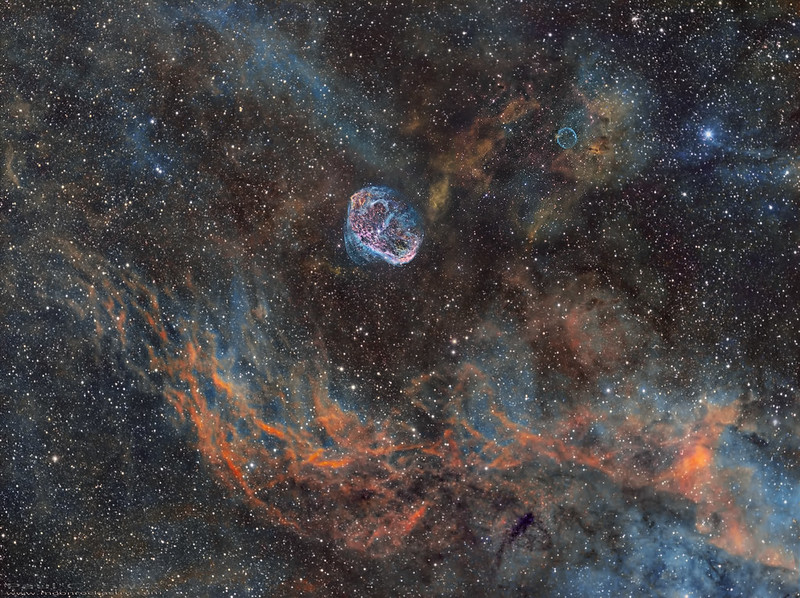 Dust-Scape in Cygnus by Paul C. Swift, on Flickr
Dust-Scape in Cygnus by Paul C. Swift, on Flickr
URL of website, http://moonrocksastro.com/wp-content/up ... -scape.jpg
Copyright: Paul C. Swift
 Dust-Scape in Cygnus by Paul C. Swift, on Flickr
Dust-Scape in Cygnus by Paul C. Swift, on FlickrRe: Submissions: 2017 September
This image is an further work on a previous image that I released last week. After finding that it was possible to bring out details of the lunar limb using the imagery made during the total eclipse I started looking a bit further into the topic. It showed that there is very nice software from the International Occultation Timing Association, called Occult, that contains a very accurate height model of the moon that can be used to for timing of occultations of stars by the moon. This same software can also generate lunar limb graphs for solar eclipses.
I decided to put the software to the test and see how well it would coincide with the images that I made. So I used the GPS coordinates that I grabbed during the eclipse and started to look at the generated graphs for the exact times of the 2nd and 3rd contacts. I was astonished to see the accuracy of the software. The graphs exactly coincide with the Bailey beads that I observed and imaged. In this way you can retrieve the times that the images were taken to about 1/10 of a second accurate.
In this image I have tried to put it all together. On the sides you can see images taken around 2nd and 3rd contact together with the height model and locations in yellow where the sunlight passed through the valleys between the craters. In the central image you can see a 'stack' of all my bead images that leads to an impression of the lunar surface structures on the limb during the eclipse from our location, Teton Village, WY.
All images were taken with a Nikon D810a with a 300mm Nikon lens.
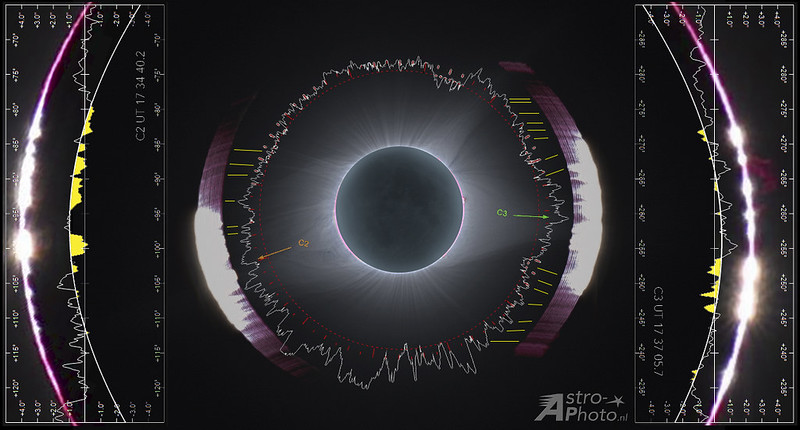
Lunar features visible during totality... by Andre van der Hoeven, on Flickr
I decided to put the software to the test and see how well it would coincide with the images that I made. So I used the GPS coordinates that I grabbed during the eclipse and started to look at the generated graphs for the exact times of the 2nd and 3rd contacts. I was astonished to see the accuracy of the software. The graphs exactly coincide with the Bailey beads that I observed and imaged. In this way you can retrieve the times that the images were taken to about 1/10 of a second accurate.
In this image I have tried to put it all together. On the sides you can see images taken around 2nd and 3rd contact together with the height model and locations in yellow where the sunlight passed through the valleys between the craters. In the central image you can see a 'stack' of all my bead images that leads to an impression of the lunar surface structures on the limb during the eclipse from our location, Teton Village, WY.
All images were taken with a Nikon D810a with a 300mm Nikon lens.

Lunar features visible during totality... by Andre van der Hoeven, on Flickr
Last edited by avdhoeven on Thu Sep 28, 2017 3:11 pm, edited 1 time in total.
Re: Submissions: 2017 September
-
StefanMuckenhuber
- Ensign
- Posts: 30
- Joined: Tue Mar 03, 2015 5:22 pm
Re: Submissions: 2017 September
M101 - 15h exposure time
Skywatcher Esprit 100 APO
ATIK 460ex mono
Skywatcher AZ-EQ6
Pixinsight 1.8
Skywatcher Esprit 100 APO
ATIK 460ex mono
Skywatcher AZ-EQ6
Pixinsight 1.8
-
StefanMuckenhuber
- Ensign
- Posts: 30
- Joined: Tue Mar 03, 2015 5:22 pm
-
Achim Schaller
- Ensign
- Posts: 19
- Joined: Sun Oct 10, 2010 3:48 pm
Re: Submissions: 2017 September

http://www.astrobin.com/314486/0/?nc=user
Stack of 166 images of Corona Arch (near Moab, Utah). Thin crescent moon was lighting the arch.
I used my own freeware "Startrails.exe" to stack the images
-
Achim Schaller
- Ensign
- Posts: 19
- Joined: Sun Oct 10, 2010 3:48 pm
Re: Submissions: 2017 September

http://www.astrobin.com/314487/?nc=user
Startrails above the The Kaibab National Forest
While sleeping in our campervan close to the Grand Canyon I took a series of images to make startrails. First I was disappointed because of the one car driving by, but now I am happy because otherwise the trees wouls have been much darker...
I used my own freeware "Startrails.exe" to stack the images
Re: Submissions: 2017 September
Cygnus-Starfield - between Cocoon and Crescent Nebula, Berne, Switzerland, Aug. 20, 2017
http://www.sternklar.ch/images-webpages ... Aug-17.htm
Exposure data:
Carl Zeiss Milvus Planar T* 85 mm 1:1.4 ZE @ f/2.8 with Canon EOS 6Da. Exposure time: 117 x 2 minutes @ 800 Asa.
Copyright: Manuel Jung, http://www.sternklar.ch
http://www.sternklar.ch/images-webpages ... Aug-17.htm
Exposure data:
Carl Zeiss Milvus Planar T* 85 mm 1:1.4 ZE @ f/2.8 with Canon EOS 6Da. Exposure time: 117 x 2 minutes @ 800 Asa.
Copyright: Manuel Jung, http://www.sternklar.ch




